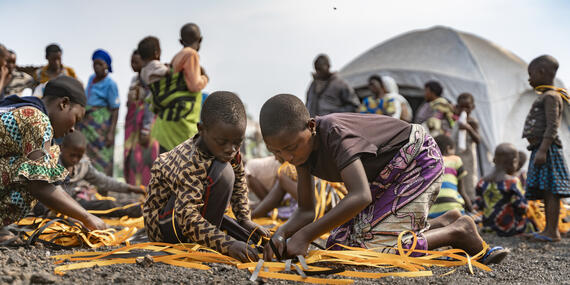Today's top news: Occupied Palestinian Territory, Democratic Republic of the Congo, Global Humanitarian Overview

Occupied Palestinian Territory
Philippe Lazzarini, the Commissioner-General of the UN Relief and Works Agency for Palestine Refugees in the Near East (UNRWA), said today that he has written to the President of the UN General Assembly to inform him that UNRWA’s ability to continue delivering its mandate in Gaza has now become very limited. He noted the constant bombardment and low and irregular flow of food and other humanitarian supplies into the Gaza Strip, compared to the immense needs of displaced people in UNRWA’s overcrowded shelters and outside.
He added that more than 130 UNRWA colleagues have been killed, most with their families. At least 70 per cent of UNRWA staff have been displaced, many of them multiple times.
Mr. Lazzarini said that in his 35 years of work in complex emergencies, he would never have expected to write a letter predicting the killing of his staff and the collapse of the mandate that UNRWA is expected to fulfil.
OCHA reports that by last night, 69 trucks carrying humanitarian supplies and 61,000 litres of fuel entered from Egypt into Gaza. These quantities are nowhere near sufficient to meet overwhelming humanitarian needs in Gaza – not to mention that the complete lack of safety in Gaza is severely limiting access to people in desperate need.
Rafah was the main governorate in Gaza where limited aid distributions took place yesterday. In the adjacent Khan Younis governorate, except for the delivery of medical supplies to two hospitals, aid distribution largely stopped due to the intensity of hostilities.
Also yesterday, the World Health Organization delivered trauma and emergency care supplies to the European Gaza Hospital and Nasser Medical Complex in Khan Younis, to cover the needs of 4,500 patients. This was the first delivery mission since 29 November, despite active hostilities in the area.
Democratic Republic of the Congo
OCHA is concerned by the escalation of hostilities in Masisi territory, in North Kivu Province, in the northern Democratic Republic of the Congo (DRC).
Yesterday morning, local sources reported that people in several villages fled their homes near Mushaki – which is about 45 km from Goma – due to fighting between the Congolese Army and an armed group.
One of these villages includes Bihambwe – a place of refuge for thousands of people fleeing the fighting – which has been emptied of its civilian population, including some 60,000 displaced people who arrived between October and November.
Humanitarian access is severely restricted in Masisi. Traffic is reportedly cut off on the road linking Goma to the centre of Masisi, and this is likely to hamper the work of aid organizations seeking to help tens of thousands of displaced people.
Despite the situation, humanitarian partners have maintained their presence and are supporting communities affected by the violence. Between July and October, aid organizations provided support to 3 million of the more than 5 million people who urgently need assistance in North Kivu, South Kivu and Ituri Provinces.
But lack of funding for the humanitarian response remains a critical challenge. To date, our US$2.25 billion appeal to reach 10 million people in DRC is less than 40 per cent funded at $861 million.
Global Humanitarian Overview
On Monday, OCHA is launching its Global Humanitarian Overview (GHO) for 2024.
The GHO is the annual overview of humanitarian trends and needs worldwide – as well as inter-agency plans to respond to the crises. It also includes a summary of the funding needed to implement those plans over the coming year.
The GHO will be launched in Doha, Qatar, by the Under-Secretary-General for Humanitarian Affairs, Martin Griffiths, and in Geneva, Switzerland, by the Assistant Secretary-General for Humanitarian Affairs, Joyce Msuya. It will also be launched in Addis Ababa, Ethiopia, by Ramesh Rajasingham, the Director of OCHA’s Coordination Division.
The UN Secretary-General, António Guterres, will have a pre-recorded video message for the launch.
